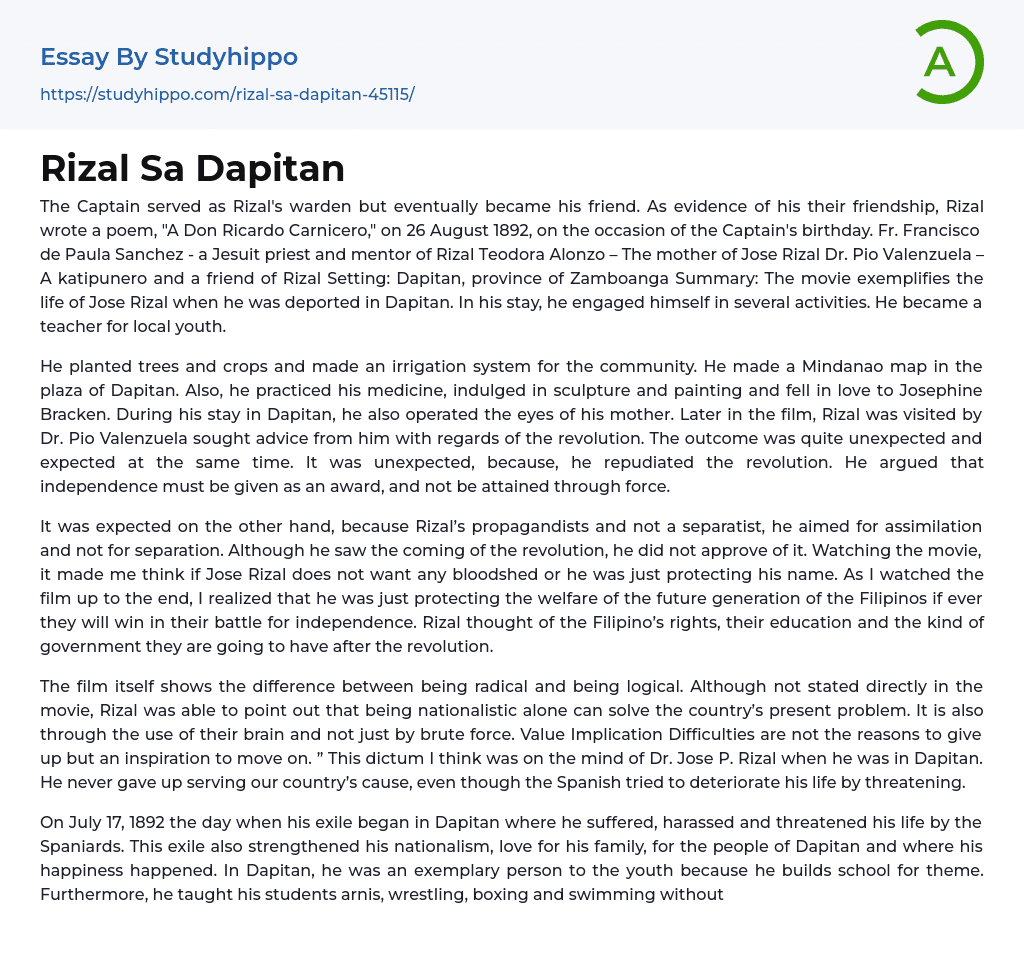The Captain, initially Rizal's warden, later became his friend. To show this friendship, Rizal composed a poem titled "A Don Ricardo Carnicero" for the Captain's birthday on August 26, 1892. During this time, Rizal also had significant individuals in his life including Fr. Francisco de Paula Sanchez, a Jesuit priest and mentor; Teodora Alonzo, his mother; and Dr. Pio Valenzuela, a katipunero and Rizal's friend. The events in the story occur in Dapitan, a province in Zamboanga. In summary, the film depicts Jose Rizal's experiences during his deportation to Dapitan where he took part in various activities and even served as a teacher for local youth.
While in Dapitan, Rizal engaged in a variety of activities such as planting trees and crops, creating an irrigation system for the community, and showcasing his artistic talents through sculpture, painting, and craf
...ting a Mindanao map. He even performed eye surgeries on his own mother, demonstrating his medical skills. During this period, Josephine Bracken became an important part of his life. A significant event occurred when Dr. Pio Valenzuela sought Rizal's advice on the revolution. Surprisingly, Rizal rejected the idea of revolution, believing that independence should be granted as a reward rather than achieved through force.
On the other hand, it was anticipated that Rizal's propagandists were not separatists but aimed for assimilation instead of separation. Although he predicted the revolution, he disapproved of it. While watching the movie, I pondered whether Jose Rizal disapproved of any violence or if he was simply safeguarding his reputation. However, as the film progressed, I realized that he was primarily concerned with protecting the welfare of future generations of Filipinos in
case they achieved independence through their battle. Rizal contemplated the rights of Filipinos, their education, and the type of government they would have after the revolution.
The film highlights the contrast between radicalism and logic, with Rizal emphasizing that nationalism alone is insufficient in addressing the nation's problems. Instead, intellect should be utilized over brute force. Challenges should not discourage but motivate one to persist. Dr. Jose P. Rizal exemplified this mindset during his time in Dapitan, where he remained devoted to our country despite threats from the Spanish.
Jose Rizal's exile in Dapitan began on July 17, 1892. Despite facing suffering, harassment, and threats from the Spaniards, this period only strengthened his nationalism and love for his family and the people of Dapitan. Moreover, it brought him happiness. In Dapitan, he established a school for the youth where he taught academic subjects as well as physical activities like arnis, wrestling, boxing, and swimming - all without charging any tuition fees. Additionally, he offered medical assistance and free medicine to those in need. Notably, while in Dapitan, he even performed surgery on his mother's right eye.
In Dapitan, I greatly admired his community projects, including the implementation of a water system and lighting system that greatly improved the lives of the people. Additionally, he took on various roles such as a farmer, businessman, scientist, and inventor, earning him fame in the area. Unfortunately, his time in Dapitan was not without challenges. He faced a threat to his life from Florencio Namanan (Pablo Mercado), but demonstrated his martial arts skills in self-defense. It was during this period that he also met Josephine Bracken, who would eventually
become his wife. However, their relationship faced opposition from Father Antonio Obach, who belittled Rizal's character.
- Ranch essays
- Barangay essays
- Culture essays
- Social Control essays
- Citizenship essays
- Social Justice essays
- Caste System essays
- Social Responsibility essays
- Socialization essays
- Deviance essays
- Modern Society essays
- Popularity essays
- Civil Society essays
- Community essays
- Female essays
- Filipino People essays
- Igbo People essays
- Indigenous Australians essays
- Indigenous Peoples essays
- Minority Group essays
- Social Institution essays
- Men essays
- The nation essays
- Middle Class essays
- Social Norms essays
- Discourse Community essays
- Popular Culture essays
- Car Culture essays
- American Culture essays
- Mormon essays
- Indian Culture essays
- Mexican Culture essays
- Pop Culture essays
- Cultural Differences essays
- Culture Shock essays
- Different Cultures essays
- World War I essays
- World War Ii essays
- Atomic Bomb essays
- American Civil War essays
- Attack essays
- Cold War essays
- Crimean War essays
- Emilio Aguinaldo essays
- Iraq War essays
- Korean War essays
- Nazism essays
- Nuclear Weapon essays
- Philippine Revolution essays
- Trench Warfare essays




